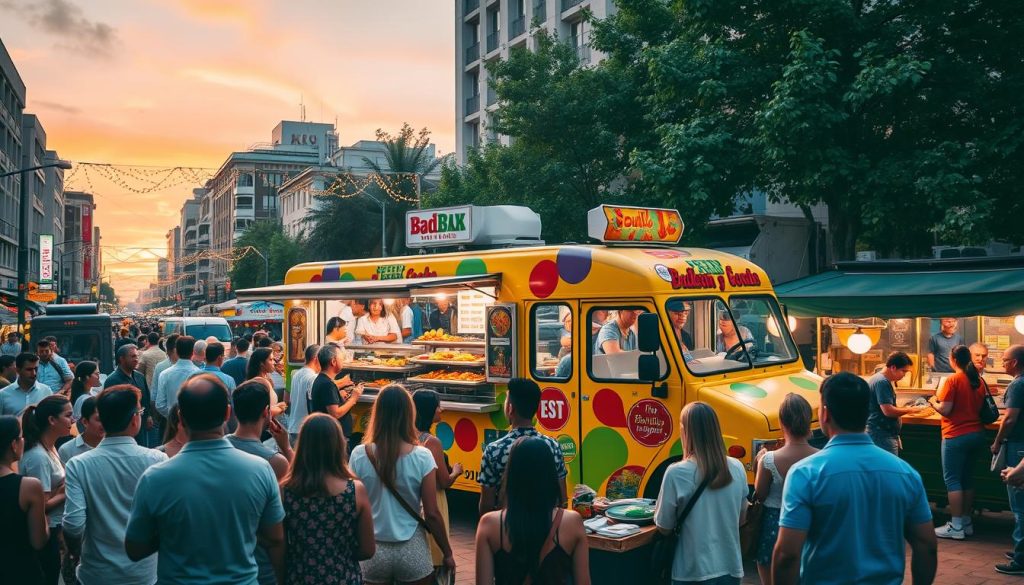The food truck scene is booming in the UK, offering a thrilling culinary adventure. These mobile kitchens bring gourmet bites and unique flavours right to the streets. They’ve changed the way we eat outside, making diverse culinary experiences easily accessible.
Social media has played a big part in their success. People love sharing photos of tasty dishes from food trucks online. This has made these mobile eateries a hit, perfect for those always on the move. They celebrate the variety of international cuisine found in the UK.
The Rise of the Food Truck Culture in the UK
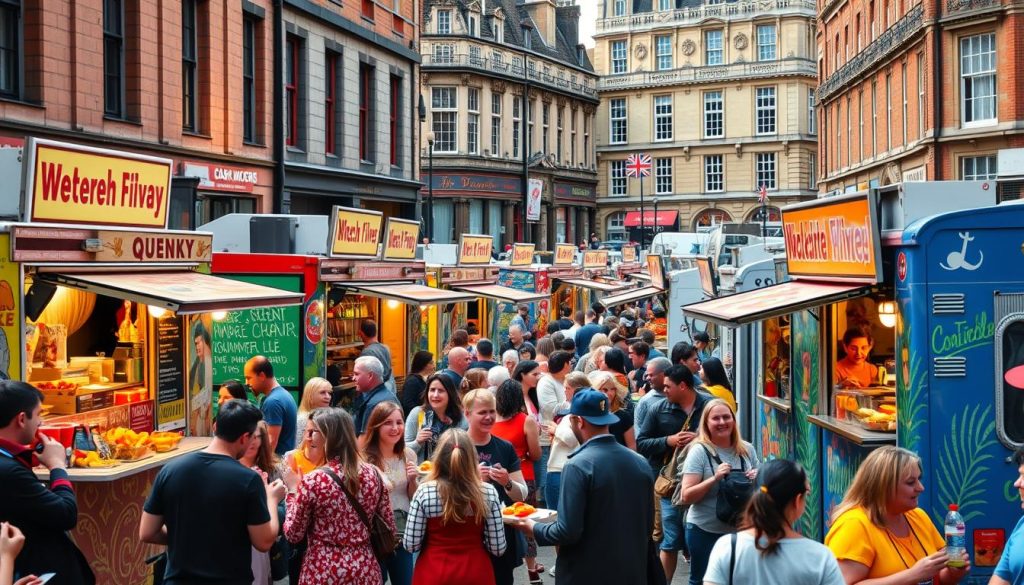
The food truck scene in the UK started with simple market stalls and mobile vendors. Over time, it grew into the lively food truck culture we know today. Street food became popular, especially from the early 2000s, as cities welcomed casual dining.
Now, diverse culinary trends from around the world have made this scene even more exciting. This has drawn in people who love to try new foods.
Historical Background
Food trucks have changed how we enjoy food in the UK. They went from being just for convenience to being gourmet mobile kitchens. These trucks now offer a mix of local and international dishes.
Food festivals and markets have helped make street food a big part of modern dining. This has made food trucks a key part of the UK’s food scene.
Today, food trucks are all about new and exciting food. They offer a wide variety of dishes, showing a move towards inclusivity and creativity in the food world. People can enjoy many different foods from a food truck, showing how big this trend is in UK dining.
Exploring Diverse Cuisine Options on Food Trucks
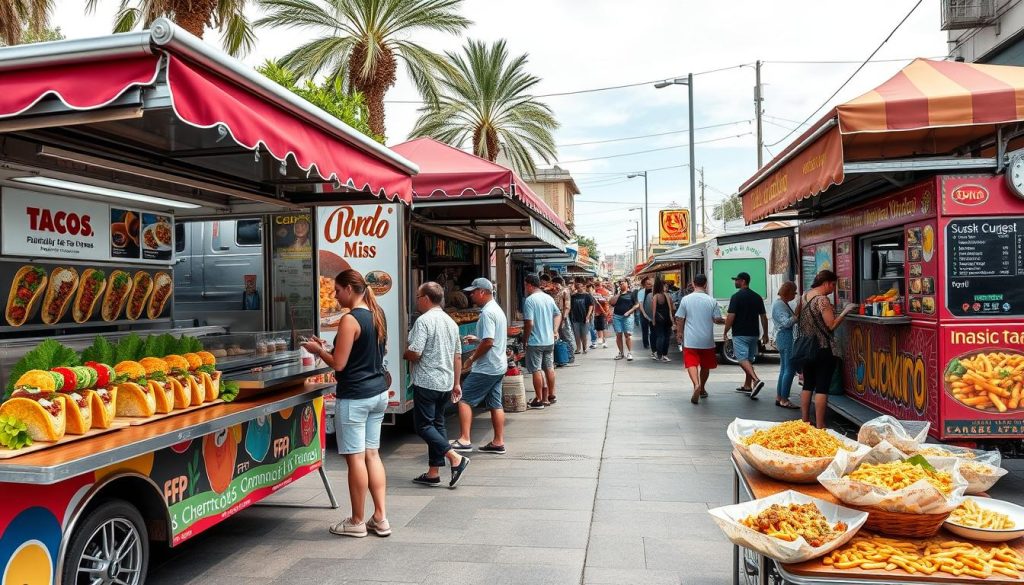
Food trucks have become a key part of our food scene. They offer a wide range of tastes for everyone. You can find everything from traditional British dishes to international favourites.
These mobile kitchens serve up everything from tasty Mexican tacos to aromatic Indian curries and Middle Eastern wraps. It’s like going on a food adventure without leaving your spot.
Now, food trucks are also offering vegan and vegetarian choices. This shows how they’re adapting to what people want. They’re adding plant-based dishes to their menus, making eating out more sustainable.
- Classic British options, such as fish and chips
- Spicy Mexican tacos topped with fresh salsa
- Rich Indian curries served with rice or naan
- Delicious Middle Eastern wraps filled with falafel
- Fresh and exciting vegan burgers and salads
Food trucks do more than just serve food. They introduce us to new tastes and traditions. With their diverse menu, they’re perfect for exploring different cultures through food.
How to Start Your Own Food Truck Business
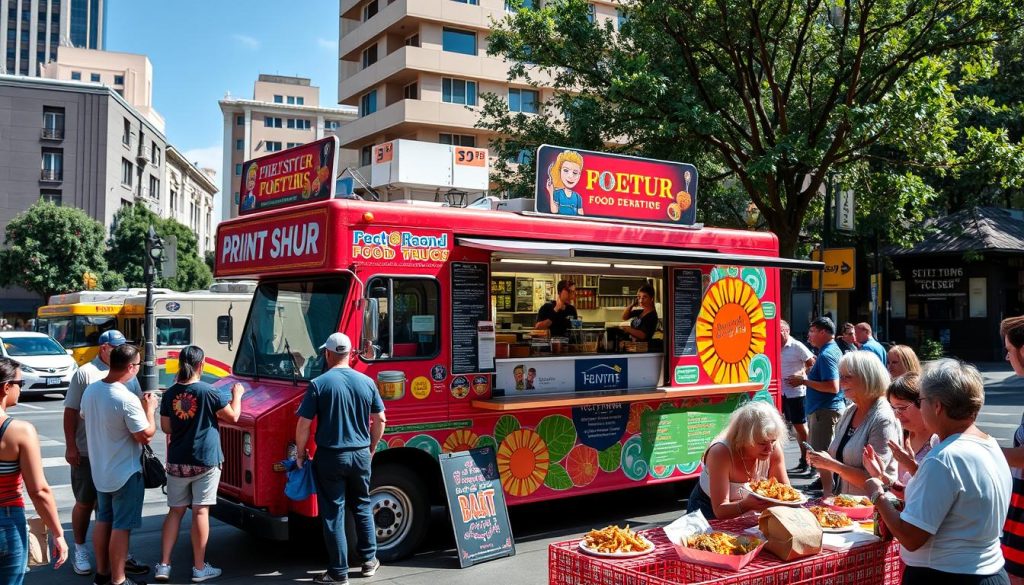
Starting a food truck business needs careful planning and understanding of entrepreneurship. Owners must take key steps to turn their ideas into a success. A strong start comes from a detailed business plan. This plan outlines operations, funding, and marketing strategies.
Essential Steps
Setting up a food truck business involves several important steps:
- Conduct Market Research: It’s crucial to know your local market and what people like to eat. Find out what’s missing that your truck could offer.
- Develop a Business Plan: A detailed business plan shares your goals, aims, and money predictions. It’s key for getting funding and running your truck smoothly.
- Source Equipment: Buy quality equipment that suits your cooking style and attracts customers. Make sure it meets health and safety rules.
- Obtain Permits and Licences: Learn about the rules for food trucks in your area. Getting the right permits is vital for legal operation.
- Determine Startup Costs: Work out the initial costs for equipment, permits, and licenses. Don’t forget ongoing expenses like food and staff costs when setting prices.
Starting a food truck business is exciting and full of chances. Entrepreneurs can share unique dishes with the community. Every step towards your food truck builds a strong base for success.
Food Truck Locations: Finding the Perfect Spot
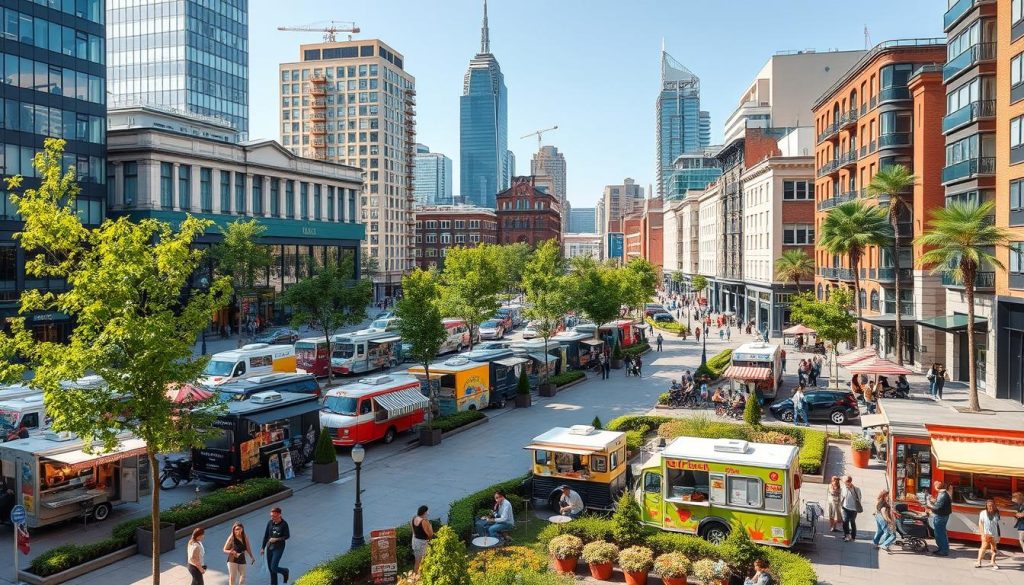
Finding the right spot for a food truck is key to success. It’s important to know what draws people in and keeps them interested. Key things to think about include:
- How many people walk by during busy times.
- Being close to events like festivals and markets.
- Looking at what other food places are already there.
Urban planning helps pick the best spots for food trucks. Places with lots of people walking around, like city centres and universities, work well. Being able to change plans quickly is also vital. This lets food truck owners move to where people want to be and follow new trends.
Good spots for food trucks are:
- Areas with lots of people, like business districts.
- Events where food lovers meet.
- Markets that are always busy.
Knowing how these things work helps make better choices for where to put food trucks. This leads to a successful business in a tough market.
Food Truck Events: Connecting with Food Lovers
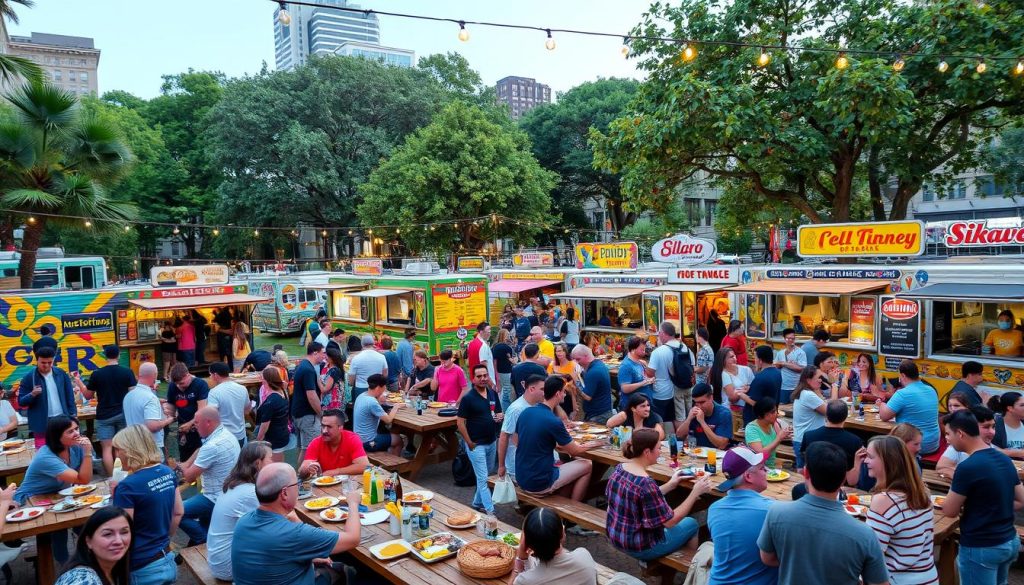
Food truck events and festivals are great for food entrepreneurs. They help connect with the community, draw in new customers, and increase sales. These events bring together a mix of culinary delights in a lively setting. Food lovers meet to enjoy and celebrate local food.
Being part of food truck events has many benefits:
- Increased Visibility: Food trucks get seen by more people, which can lead to new customers.
- Networking Opportunities: Meeting other food vendors helps with collaboration and learning.
- Feedback: Talking to customers gives food truck owners insights into what people like and expect.
Social media is key to promoting food truck events. Sharing updates and details online helps increase attendance and engage with the community. Using hashtags and interacting with followers builds excitement.
Local fairs and festivals create buzz around regional food trucks. Being there boosts brand awareness and strengthens local ties. Food truck owners can offer unique dishes that feature local ingredients. Food truck events are a great way to meet food enthusiasts and build community spirit.
Popular Food Truck Trends in British Cities
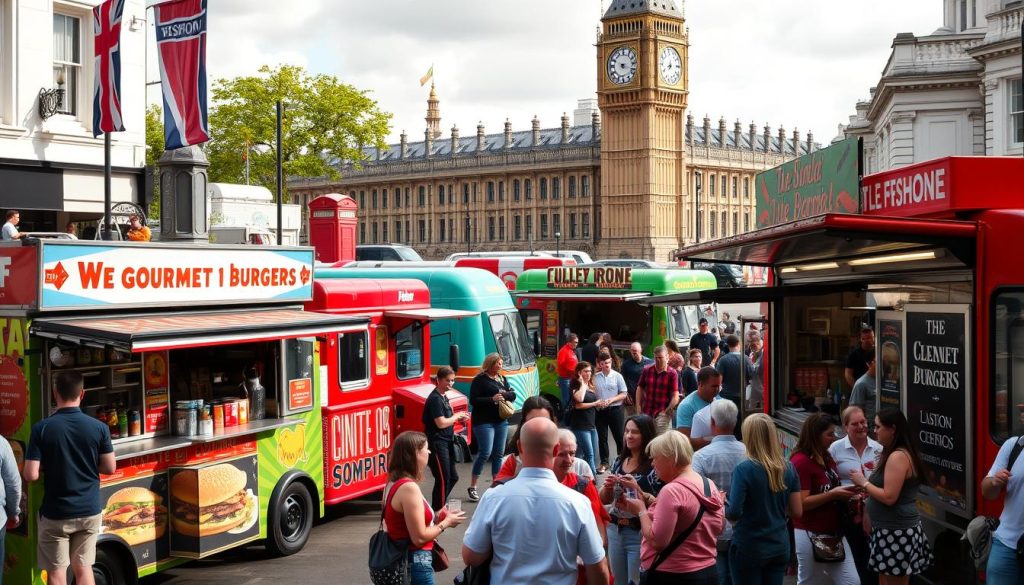
Food trucks are big in cities like London, Manchester, and Birmingham. They now focus more on healthy eating, meeting the need for nutritious meals. This change shows a move towards using fresh ingredients and plant-based foods.
Fusion foods are big in food trucks too. Chefs mix traditional dishes with flavours from around the world. This creates exciting tastes that keep people coming back. You can find things like Asian tacos or Indian wraps that attract a wide audience.
Technology is changing how food trucks work, making things easier for customers. Many use apps for ordering and paying without touching anything. This fits well with the busy lives of city people, letting them enjoy new foods quickly.
Marketing Strategies for Food Truck Entrepreneurs
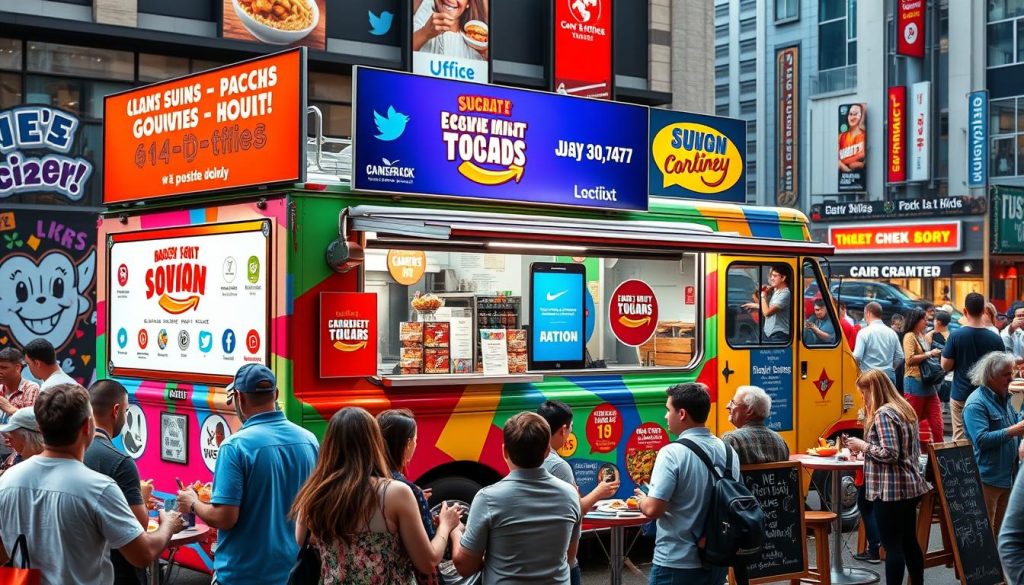
Effective food truck marketing is key to drawing in customers and ensuring success. Entrepreneurs should use a mix of promotional strategies that speak to their audience. A strong online presence, especially on social media, is vital for connecting with potential customers and showing off what they offer.
Creating eye-catching content boosts branding. High-quality images of food and behind-the-scenes moments build a bond with customers and spark excitement. Local ads like flyers and events also help spread the word. These methods work well alongside online efforts to reach more people.
- Use social media to share news and special deals.
- Interact with customers through fun content.
- Start loyalty programmes to get customers coming back.
Having a unique brand identity helps a food truck stand out. A thoughtful branding strategy should mirror the business’s values and personality. This makes it simpler for customers to find and relate to the truck. Thus, successful food truck marketing comes from combining new and old promotional tactics. This approach helps build a dedicated customer base.
Food Truck Regulations and Licensing in the UK
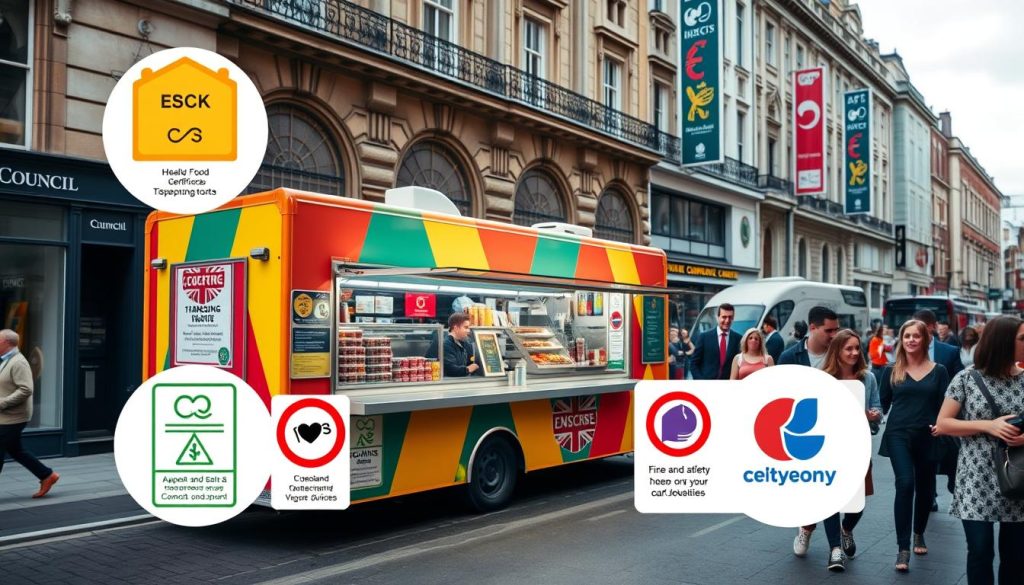
For those dreaming of running a food truck in the UK, it’s key to know the rules. It’s vital to understand food truck regulations to keep your business on the right track.
Getting the right licenses is a big step. You must register your food business with the local council. This shows you’re serious about food safety and helps you follow the law.
Each area has its own rules, so it’s important to check what’s needed in your area. These rules can affect where and when you can sell food. Knowing these rules helps you avoid fines and keeps your business running smoothly.
Health and safety standards are also crucial. You’ll need to pass regular checks on hygiene, equipment safety, and how you store food. Meeting these standards is key to being known for quality and safety.
In short, knowing about food truck laws, licenses, and following the rules is key to success. It keeps you out of legal trouble and builds trust with customers. This is good for your business in the long term.
Tips for Menu Creation on Your Food Truck
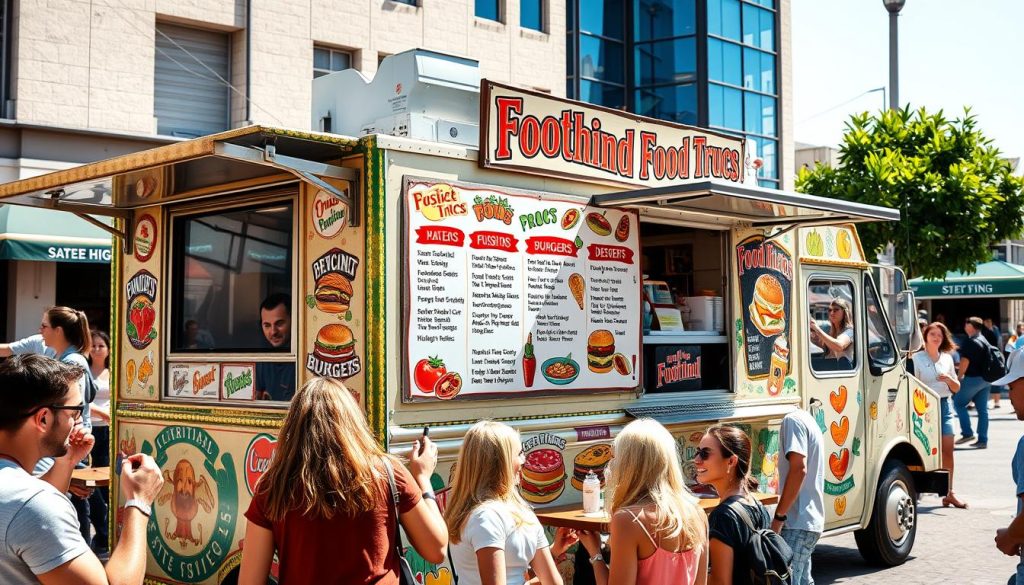
Creating a great food truck menu is key to drawing in customers and showing off your culinary skills. It’s like a window into your brand and can really sway what customers choose to eat. This part will give you tips on making a menu that fits your truck’s theme, takes into account local tastes, and uses seasonal ingredients.
Crafting the Perfect Menu
For a top-notch food truck menu, mix variety with a unified theme. Think about these points when making your menu:
- Reflect your theme: Make sure your menu fits your food truck’s concept.
- Keep it concise: A shorter menu helps customers decide faster and cuts down on wait times.
- Highlight seasonal ingredients: Using local and seasonal produce makes your food taste better and is good for the planet.
- Price strategically: Work out your costs and set prices that are fair but still make you money.
- Use descriptive language: Write in a way that makes customers want to try your food.
- Test your offerings: Try out your food with trials or soft openings to get feedback before you launch.
Catering Services: Expanding Your Food Truck Business
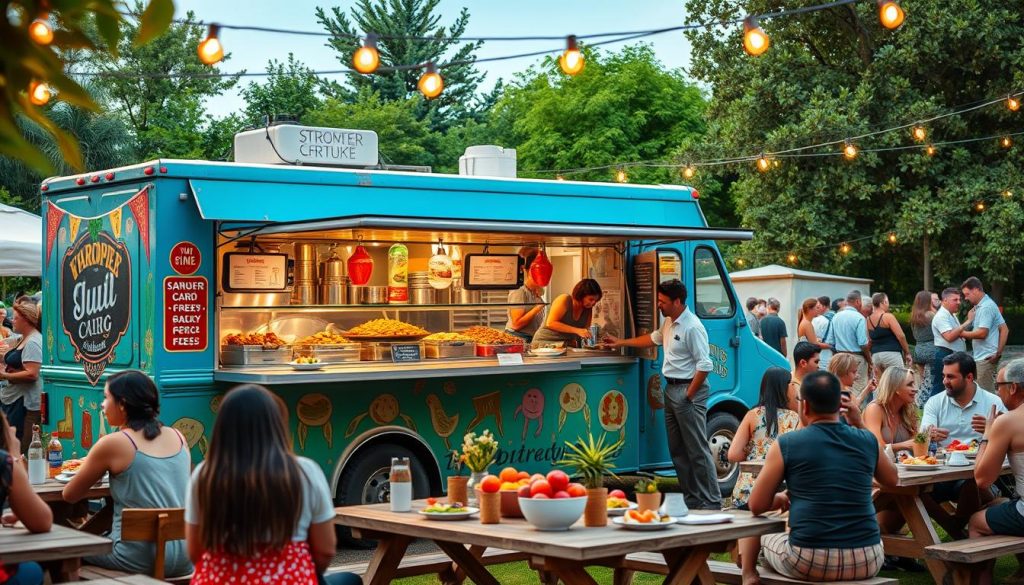
Food truck catering is a great way to grow your business. It opens doors to many opportunities, like corporate events, weddings, and private parties. By offering catering, you can make more money and reach new customers.
Here are some tips to help you succeed in catering:
- Customise Menus: Change your menu for different events. Think about what people like to eat and use fresh ingredients.
- Streamline Logistics: Plan how you’ll prepare, serve, and clean up food. This makes events run smoothly.
- Marketing Strategies: Use social media, local partnerships, and event expos to get the word out about your catering.
- Networking: Make friends with event planners and corporate clients. This helps you get more work through referrals.
Adding catering to your food truck business makes it more varied. It also helps you become known in the community. By meeting the needs of corporate events, your truck can be the go-to choice for unique meals.
How to Stand Out in a Crowded Food Truck Market
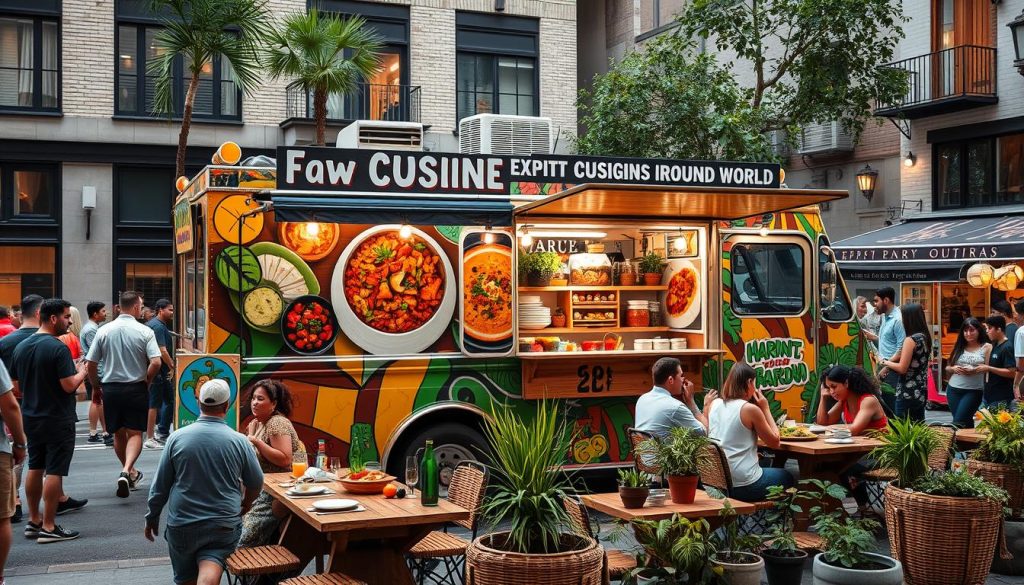
In a crowded food truck market, it’s key to stand out. You can do this by offering unique menu items that show off local tastes. Using new cooking methods also grabs attention. A strong brand that speaks to customers gives you an edge.
Great customer service builds loyal fans who will spread the word about your truck. Personal touches, like unforgettable chats and listening to feedback, build strong bonds with customers.
- Engage in community events to increase visibility.
- Collaborate with local businesses for cross-promotional opportunities.
- Utilise social media platforms to showcase your food truck’s personality.
These steps help food trucks shine and make a mark. They improve your position in the market.
Customer Engagement: Creating a Loyal Following
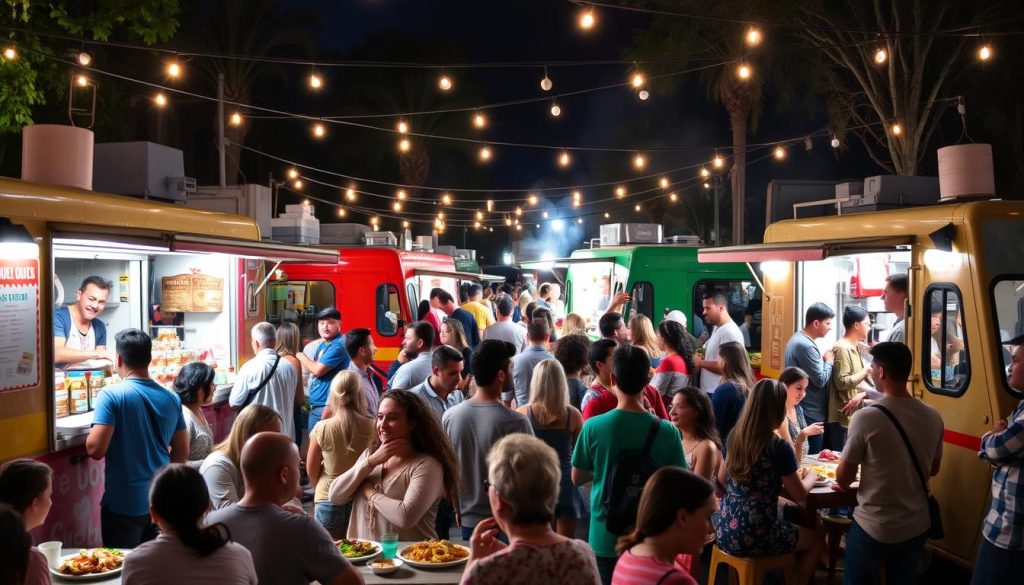
Customer engagement is key for food trucks to turn casual visitors into loyal fans. By chatting with customers on social media, businesses can talk to them right away. Sharing menu items, behind-the-scenes looks, and customer stories helps build a community and loyalty.
Asking for feedback is a great way to learn what customers like. By asking for opinions through surveys or messages, businesses can improve. This shows customers their opinions matter and helps build a loyalty programme with special deals for regulars.
In the UK food truck scene, some trucks really get it right. They join local events and work with nearby shops, building strong community links. Social media campaigns that use customer photos make the experience even better, turning happy customers into big fans of the brand.
Health and Food Safety Measures for Food Trucks
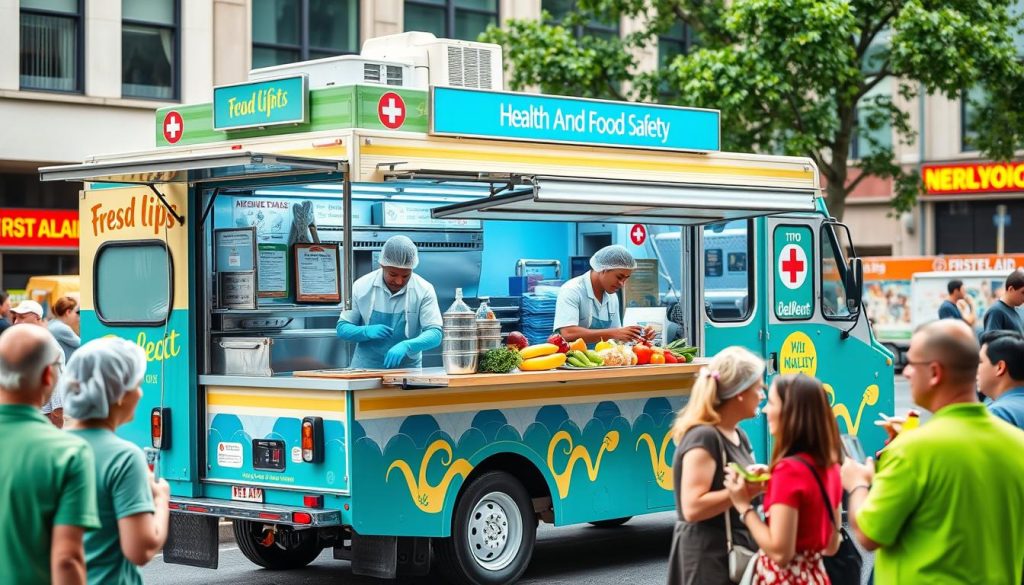
Following strict health rules is key in the food truck world. A strong focus on food safety keeps customers safe and helps build trust. This trust is crucial in a crowded market.
Important steps to follow food safety rules include:
- Using the right food storage to avoid contamination.
- Keeping the food truck clean.
- Training staff well in food safety.
It’s important to have regular checks to see if food trucks follow health rules. These checks should look at things like clean equipment, food temperatures, and staff knowledge. Following these steps makes the food truck run better and makes sure customers feel safe eating there.
Embracing Sustainability in the Food Truck Business
The food truck industry is growing fast. Adding sustainable practices is key for operators to cut down on their environmental impact. An eco-friendly food truck can draw in customers who care about the planet. By using local ingredients, owners help regional farmers and lower the carbon footprint from long transport.
Managing waste is also vital for an eco-friendly food truck. Reducing food waste helps the environment and helps the community. Donating extra meals or adjusting portion sizes is a good move. Using biodegradable packaging means less waste ends up in landfills, making a big difference.
These sustainable steps are good for the planet and attract customers who share these values. By being seen as eco-friendly, food trucks can stand out and grow in a tough market. They support positive environmental change. Sustainability is a win for everyone involved.

